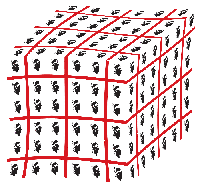Rudy Arthur
(University of Edinburgh)
18/06/2010, 14:30
Theoretical developments
We apply twisted boundary conditions to off-shell Rome-Southampton
non-perturbative renormalisation. This enables us to select momenta
that are not necessarily a Fourier mode. The technique allows
better controlled continuum extrapolation of results by removing
O(4) breaking ambiguity. Continuity of the momentum scale allows us to develop a
step-scaling technique that does not require...
Stefan Sint
(Trinity College Dublin)
18/06/2010, 14:50
Theoretical developments
The chirally rotated Schroedinger functional (SF) provides a test bed
for universality and automatic O(a) improvement.
In joint work with Bjoern Leder, we have implemented
the chirally rotated Schroedinger functional and carried out
extensive quenched simulations. We demonstrate that, after proper tuning
of a dimension 3 boundary counterterm, the expected chirally rotated
SF boundary...
Maarten Golterman
(San Francisco State University)
18/06/2010, 15:10
Theoretical developments
Partially quenched lattice QCD is defined in euclidean space, and usually
considered not be unitary. This raises the question whether effective
field theory methods, such as chiral perturbation theory, can be justified
in the partially quenched case. In this talk, we take a first step, in which
we construct a transfer matrix for the ghost sector of partially quenched
theories. While...
Kouta Usui
(University of Tokyo)
18/06/2010, 15:30
Theoretical developments
We rigorously show that free overlap Dirac fermions on lattice satisfies the Osterwalder Schrader reflection positivity condition, which leads to the unitarity property of the corresponding quantum theory.
Tatsuhiro MISUMI
(Yukawa Institute for Theoretical Physics, Brookhaven National Laboratory)
18/06/2010, 15:50
Theoretical developments
There is a chance that Minimal-doubling fermion actions will remove a numerical expense in Lattice QCD simulations although all the known examples so far lack sufficient discrete symmetries for a good continuum limit. In this talk we discuss classification and unification of Minimal-doubling actions to search for possibiliy of their application. In this context we propose a new class of...

